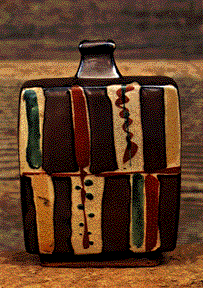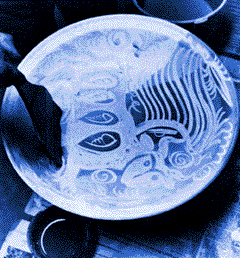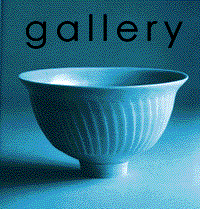WAX RESISIT is a type of glaze decoration
that involves the application of a coat of one glaze, then painting a wax
pattern, then applying a second coat of the same or a different glaze. The
wax resists the second glaze from adhering, allowing the painted design
to show.
HERE'S HOW TO DO IT:
1. First, a glaze is applied by dipping 2 seconds. After this glaze
has dried to the touch, a design is painted onto this glaze with wax and
allowed to dry. Next, another glaze is applied by dipping 2 seconds. The
wax will resist the second glaze in the areas to which the wax has been
applied. Some of the second glaze will always adhere to the wax and this
is unavoidable. If you do not like this, carefully wipe away these 'beads'of
glaze with your sponge or a very fine brush.
2. One of the major drawbacks of this technique is the increased potential
for the glaze to run because of the double application of glaze. This is
why it is essential to only apply each glaze for a maximum of 2 seconds,
so the overall application time does not exceed 4 seconds. If you put on
more glazes than the two that are recommended, then the glaze will surely
run during firing, and your piece will adhere to the kiln shelf or firing
'cookie.'
3. The major advantage of the technique is the wide variety of beautiful
effects possible with the combining of glazes. Recommended best bets are
to begin with a dark glaze (Temmoku, Joe's black, Reitz green, Salmon Red)
as the first glaze applied, then painting a wax design and follow by applying
a light colored, or white glaze second (Opaque white, Satin white, Celadon,
Winokur yellow, etc.).
4. MAKE SURE THERE IS PLENTY OF ROOM AT THE BOTTOM OF YOUR PIECE IN CASE THE GLAZE RUNS!
5. A variation on the technique is to apply a light colored glaze to a piece of bisqueware, then apply a pattern of wax onto the glaze using brushes or sponge stamps, then after the wax has dried, brush on oxide washes. The example at the right, by Warren McKenzie illustrates this process. An advantage of this variation is that the piece has only one glaze, reducing the change of glaze running during firing.

SHOJI HAMADA, JAPAN, 20th century, Bottle, Stoneware with Wax Resist design and overglaze enamels

WARREN MCKENZIE, USA, Brushing a cobalt wash over a wax resist pattemn



